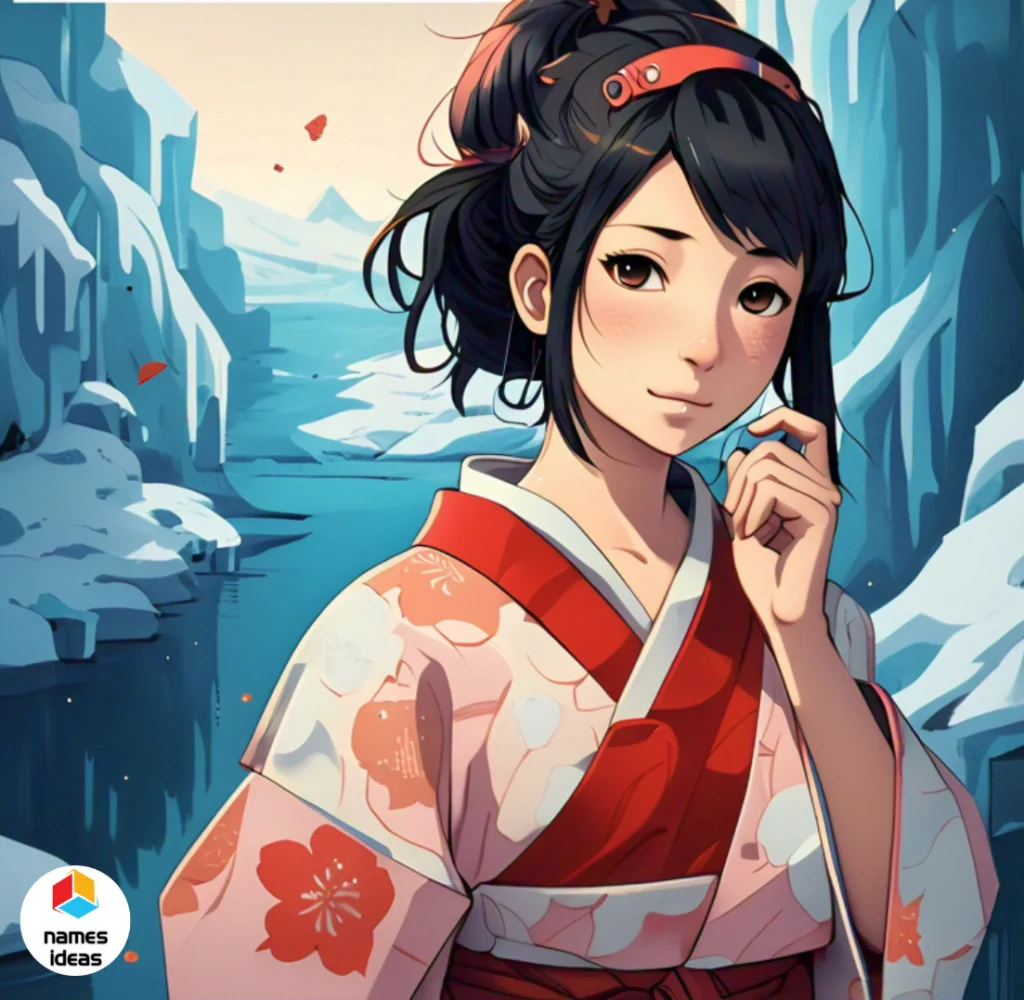Japanese names that mean ice offer a cool, unique, and elegant option for your child’s name, reflecting beauty and strength with charm. These names, inspired by the beauty of ice and snow, symbolize purity and calm. If you’re seeking a name with a fresh, wintery touch, Japanese names with meanings related to ice are an elegant choice that also carries cultural significance.
Japanese names that mean ice are a great choice if you want a name that’s both meaningful and distinct. These names reflect the clarity and calm of ice, adding a touch of winter magic to your child’s name. Explore our guide to find the perfect Japanese name with an icy touch.
Best Japanese Names That Mean Ice
Japanese Names That Mean Ice capture the serene beauty and clarity of winter. These names evoke a sense of purity and elegance, making them a unique choice for reflecting a cool and tranquil essence. With their crisp, refreshing qualities, they offer a perfect blend of traditional charm and modern sophistication.
Modern Japanese Names That Mean Ice with a Trendy Twist
- Aisuke (愛介) – “Love” + “Help” – Combining affection with a cool edge.
- Rei (零) – “Zero” or “Ice” – Minimalist and chic.
- Koori (氷) – “Ice” – Simple yet stylish.
- Fuyuki (冬樹) – “Winter” + “Tree” – A modern nature-inspired choice.
- Yukio (雪男) – “Snow” + “Man” – Classic with a contemporary feel.
- Hikari (光) – “Light” – Icy elegance with a touch of brilliance.
- Tsubasa (翼) – “Wings” – Soaring with a cool, icy vibe.
- Shiro (白) – “White” – Clean and modern.
- Asahi (朝日) – “Morning Sun” – Fresh and bright like morning frost.
- Sora (空) – “Sky” – Cool and limitless.
- Kazu (和) – “Harmony” – Trendy and serene.
- Haru (春) – “Spring” – Icy freshness with a touch of warmth.
- Natsu (夏) – “Summer” – A cool twist on a warm name.
- Riku (陸) – “Land” – Modern and grounded.
- Suki (好き) – “Beloved” – Chic and stylish.
- Aya (彩) – “Color” – Icy hues with a trendy flair.
- Miku (未来) – “Future” – Forward-thinking with a cool edge.
- Kaito (海斗) – “Ocean” + “Fight” – Cool as the sea with a modern touch.
- Rina (理奈) – “Logic” + “Grace” – Icy intelligence with elegance.
- Jin (仁) – “Compassion” – A trendy name with a cool vibe.
- Mio (美緒) – “Beautiful” + “Thread” – Icy beauty woven with modern charm.
- Kyo (京) – “Capital” – Modern and stylish.
- Yumi (由美) – “Reason” + “Beauty” – Chic and refined.
- Nori (海) – “Sea” – Trendy with a touch of ice.
- Akira (明) – “Bright” – Icy brilliance with a modern edge.
- Sae (早) – “Early” – Fresh and innovative.
- Yuka (由佳) – “Reason” + “Good” – Elegant and cool.
- Shin (新) – “New” – Modern and icy.
- Masa (正) – “Correct” – A trendy choice with a cool demeanor.
- Eiko (英子) – “English” + “Child” – Modern with a touch of icy sophistication.
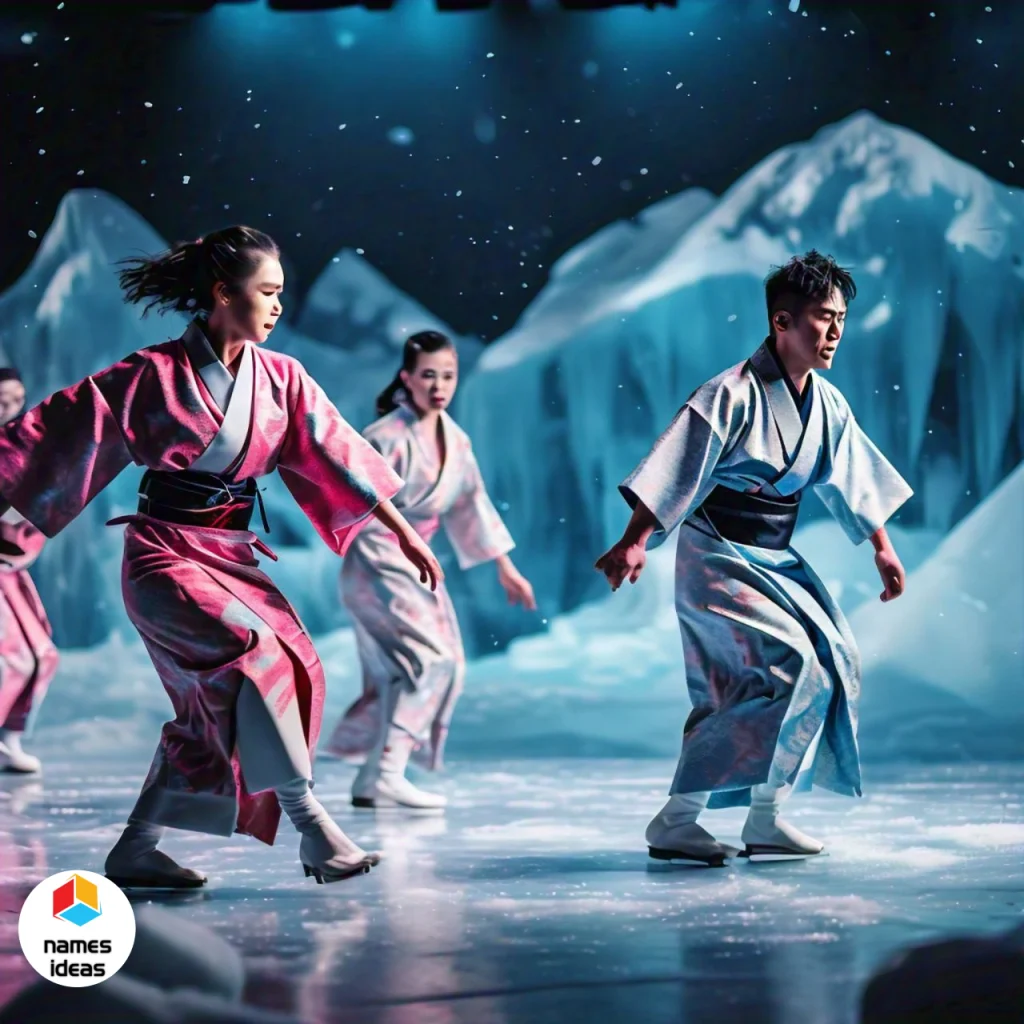
Nature-Inspired Japanese Names That Mean Ice for Serene Choices
- Koori (氷) – “Ice” – Pure and serene, evoking the essence of winter.
- Fuyuki (冬樹) – “Winter” + “Tree” – A tranquil name inspired by winter’s natural beauty.
- Yuki (雪) – “Snow” – Soft and serene, reflecting a snowy landscape.
- Shimo (霜) – “Frost” – Delicate and cool, inspired by frost-covered mornings.
- Sora (空) – “Sky” – The icy expanse of a clear winter sky.
- Aoi (青い) – “Blue” – The calm, icy blue of a frozen lake.
- Mizu (水) – “Water” – Represents the liquid form of ice, serene and essential.
- Ruri (瑠璃) – “Lapis Lazuli” – A gemstone color that evokes a cool, serene feeling.
- Nagi (凪) – “Calm” – Inspired by the peaceful calm of a frozen sea.
- Tsubasa (翼) – “Wings” – As light and graceful as the frost on a bird’s wings.
- Kaze (風) – “Wind” – The gentle breeze that accompanies winter’s chill.
- Hikari (光) – “Light” – The soft, serene light reflecting off snow and ice.
- Mori (森) – “Forest” – A peaceful, snow-covered forest scene.
- Akira (明) – “Bright” – The clear, bright light of a winter’s day.
- Yoshiki (芳樹) – “Fragrant Tree” – Inspired by the subtle beauty of nature in winter.
- Kiri (霧) – “Mist” – The serene mist that often follows a frost.
- Haruka (遥) – “Distant” – The distant, tranquil beauty of snowy landscapes.
- Hana (花) – “Flower” – The rare, delicate beauty of flowers in winter.
- Nori (海) – “Sea” – The icy calm of the winter sea.
- Shinju (真珠) – “Pearl” – The serene luster of pearls, reminiscent of ice.
- Rei (零) – “Zero” – The chill of absolute zero, representing pure ice.
- Momo (桃) – “Peach” – The gentle, cool touch of a peach’s blossom in winter.
- Yume (夢) – “Dream” – The serene, dream-like quality of a snowy scene.
- Rin (凛) – “Dignified” – The graceful and dignified presence of winter’s chill.
- Sei (青) – “Blue” – The deep blue of a frozen lake.
- Koharu (小春) – “Small Spring” – A gentle, serene name evoking the transition to spring.
- Rin (鈴) – “Bell” – The clear, crisp sound of a bell in the winter air.
- Aki (秋) – “Autumn” – The serene calm before winter arrives.
- Kumo (雲) – “Cloud” – The soft, cool clouds that blanket the sky in winter.
- Natsuki (夏樹) – “Summer” + “Tree” – A contrast reflecting the serene nature of ice and winter.
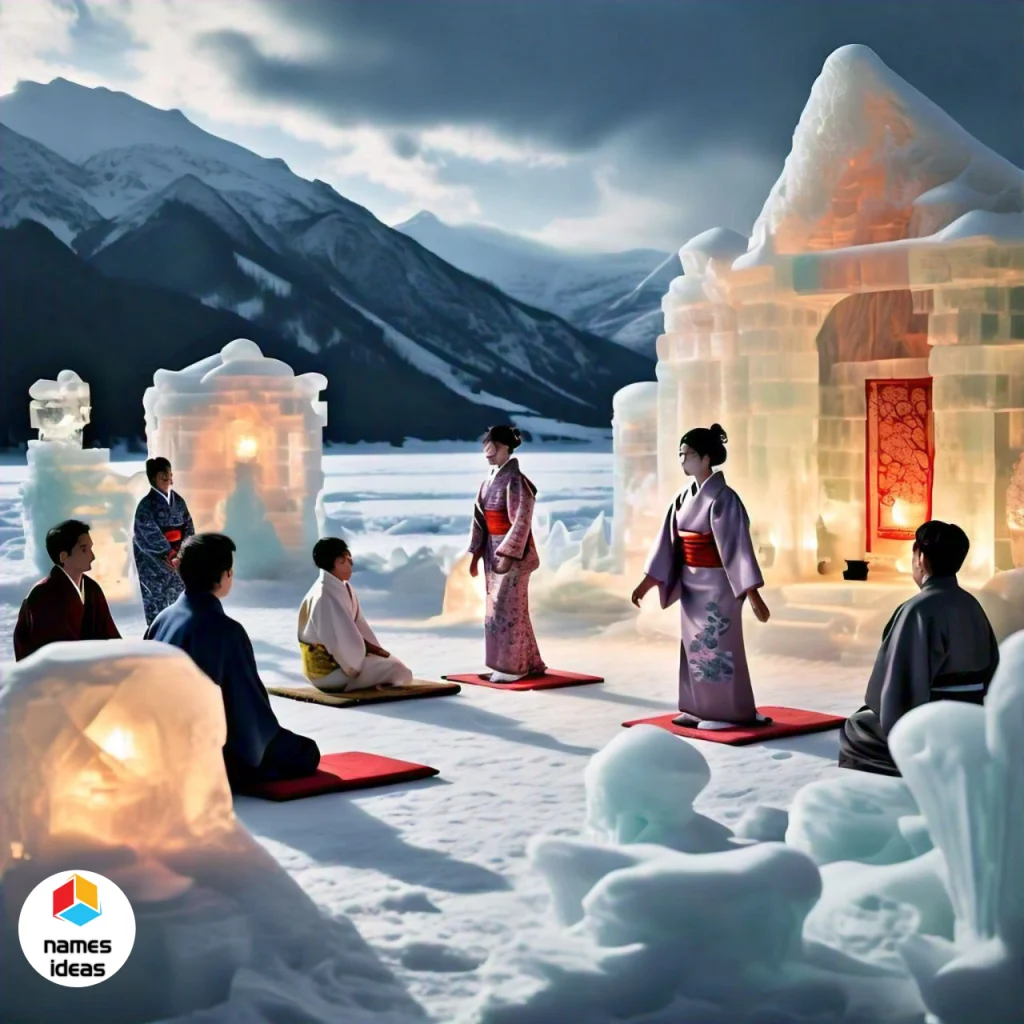
Beautiful Japanese Names That Mean Ice for Girls
- Yuki (雪) – “Snow” – Pure and delicate, evoking the beauty of fresh snowfall.
- Koori (氷) – “Ice” – Elegant and serene, reflecting the essence of winter.
- Fuyuki (冬樹) – “Winter” + “Tree” – A graceful name inspired by winter’s calm beauty.
- Shimo (霜) – “Frost” – Gentle and cool, representing the delicate nature of frost.
- Mizuki (水樹) – “Water” + “Tree” – Combining the fluidity of water with nature’s elegance.
- Hikari (光) – “Light” – The soft, serene light that reflects off ice and snow.
- Aoi (青い) – “Blue” – The calm, icy blue of a frozen landscape.
- Ruri (瑠璃) – “Lapis Lazuli” – A gemstone-inspired name with an icy touch.
- Kiri (霧) – “Mist” – The ethereal, cool mist that follows a frost.
- Rei (零) – “Zero” – Represents the cold of absolute zero, symbolizing pure ice.
- Hana (花) – “Flower” – The delicate beauty of winter flowers.
- Akira (明) – “Bright” – The clear and bright light of a crisp winter day.
- Sora (空) – “Sky” – The serene and expansive winter sky.
- Nagi (凪) – “Calm” – Reflecting the peaceful stillness of a frozen scene.
- Yume (夢) – “Dream” – The serene, dream-like quality of a snowy landscape.
- Momo (桃) – “Peach” – A gentle, cool name inspired by winter’s touch.
- Rin (凛) – “Dignified” – Graceful and poised, like the serene winter air.
- Aki (秋) – “Autumn” – The quiet beauty of the season transitioning into winter.
- Yoshiko (良子) – “Good Child” – A serene and elegant name reflecting winter’s calm.
- Sei (青) – “Blue” – The cool and tranquil blue of icy waters.
- Suzu (鈴) – “Bell” – The clear, crisp sound of a bell in winter’s chill.
- Rina (理奈) – “Logic” + “Grace” – Combining clarity with elegance.
- Koharu (小春) – “Small Spring” – A delicate name reflecting the calm before winter.
- Shinju (真珠) – “Pearl” – The serene and elegant luster of pearls, like ice.
- Mio (美緒) – “Beautiful” + “Thread” – Weaving together beauty and icy charm.
- Asuka (明日香) – “Tomorrow” + “Fragrance” – Evoking the fresh promise of winter.
- Yuri (百合) – “Lily” – A delicate flower name with a cool touch.
- Mai (舞) – “Dance” – The graceful dance of snowflakes falling.
- Saki (咲) – “Blossom” – The rare and beautiful blossom in winter.
- Rika (理香) – “Logic” + “Fragrance” – Combining clarity with a subtle, icy grace.

Charming Japanese Names That Mean Ice for Boys
- Koori (氷) – “Ice” – Simple and strong, reflecting the essence of winter.
- Yuki (雪) – “Snow” – Clean and classic, evoking the beauty of snowfall.
- Fuyuki (冬樹) – “Winter” + “Tree” – A solid, nature-inspired name.
- Shimo (霜) – “Frost” – Crisp and cool, representing frost’s delicate beauty.
- Rei (零) – “Zero” – Symbolizing the cold of absolute zero, with a modern edge.
- Kaito (海斗) – “Ocean” + “Fight” – Strong and dynamic, like the icy sea.
- Riku (陸) – “Land” – Grounded and cool, with a solid presence.
- Sora (空) – “Sky” – Expansive and serene, like a winter sky.
- Sei (青) – “Blue” – Reflecting the deep, cool blue of ice.
- Akira (明) – “Bright” – The clear, bright quality of winter’s light.
- Shin (新) – “New” – Modern and fresh, with an icy twist.
- Kaze (風) – “Wind” – The cool breeze that accompanies winter.
- Ryo (涼) – “Cool” – A straightforward name with a refreshing feel.
- Taichi (大地) – “Great Land” – Strong and serene, like a winter landscape.
- Nori (海) – “Sea” – Reflecting the icy calm of winter seas.
- Jin (仁) – “Compassion” – A cool name with a warm-hearted meaning.
- Haru (春) – “Spring” – A subtle nod to the transition from winter.
- Koharu (小春) – “Small Spring” – A gentle name with a winter touch.
- Tsubasa (翼) – “Wings” – Light and graceful, like the frost on wings.
- Yuma (優馬) – “Gentle Horse” – Combining strength with icy elegance.
- Kou (光) – “Light” – Reflecting the cool, clear light of winter.
- Haruki (春樹) – “Spring” + “Tree” – A fresh name with a hint of winter’s chill.
- Ryoichi (良一) – “Good” + “One” – A strong, cool name with positive connotations.
- Takumi (匠) – “Artisan” – Skilled and precise, like the craftsmanship of ice.
- Mitsu (光) – “Light” – A bright and cool name for a boy.
- Yoshiki (芳樹) – “Fragrant Tree” – Combining natural beauty with a cool edge.
- Ryohei (涼平) – “Cool” + “Peace” – A name that conveys a calm, serene demeanor.
- Sho (翔) – “Soar” – High and lofty, like the serene heights of winter.
- Satoshi (聡) – “Wise” – Reflecting the clarity and purity of ice.
- Shinichi (慎一) – “Prudent” + “One” – A wise and cool name with a strong presence.

Celebrity Japanese Names That Mean Ice
- Takuya (拓哉) – Popular actor Takuya Kimura, evoking a cool, charismatic presence.
- Yuki (雪) – Meaning “snow,” a name shared by actress Yuki Amami.
- Ryo (涼) – Meaning “cool,” associated with Ryo Nishikido, a well-known actor and singer.
- Sora (空) – Meaning “sky,” represented by Sora Aoi, a popular actress.
- Kaito (海斗) – Meaning “ocean,” as in Kaito Nakagawa, a rising star.
- Koori (氷) – Meaning “ice,” though not a common celebrity name, could suit an aspiring star.
- Hikari (光) – Meaning “light,” related to the renowned singer Hikari Mitsushima.
- Rei (零) – Meaning “zero,” shared by Rei Kikukawa, a famous actress and model.
- Shiro (白) – Meaning “white,” like Shiro Amano, known for his work in manga.
- Tsubasa (翼) – Meaning “wings,” associated with Tsubasa Honda, a popular actress.
- Yuma (優馬) – Meaning “gentle horse,” representing the model and actor Yuma Nakayama.
- Mizu (水) – Meaning “water,” reflecting the icy qualities of water in its frozen form.
- Akira (明) – Meaning “bright,” like the renowned actor Akira Takarada.
- Natsu (夏) – Meaning “summer,” shared by actor Natsuhi Ueno.
- Rina (理奈) – Meaning “logic” and “grace,” related to actress Rina Ohta.
- Momo (桃) – Meaning “peach,” reflecting a sweet yet cool vibe, like Momo Kizuki.
- Haruka (遥) – Meaning “distant,” linked to the actress Haruka Ayase.
- Saki (咲) – Meaning “blossom,” associated with model Saki Aibu.
- Ryohei (涼平) – Meaning “cool peace,” related to actor Ryohei Suzuki.
- Jin (仁) – Meaning “compassion,” as seen in Jin Akanishi, a famous singer.
- Yoshiki (芳樹) – Meaning “fragrant tree,” known for Yoshiki Hayashi, the rock star.
- Sei (青) – Meaning “blue,” reflecting the cool tone of the color.
- Koharu (小春) – Meaning “small spring,” related to Koharu Sugawara, a pop idol.
- Kohji (光司) – Meaning “light” and “to govern,” associated with Kohji Nishida.
- Miyuki (美雪) – Meaning “beautiful snow,” linked to actress Miyuki Matsuda.
- Aoi (青い) – Meaning “blue,” like Aoi Yuki, a well-known voice actress.
- Yukiho (雪穂) – Meaning “snow” and “ear,” related to Yukiho Hasegawa.
- Nori (海) – Meaning “sea,” linked to actor and model Nori.
- Eiko (英子) – Meaning “English child,” representing actress Eiko Koike.
- Haru (春) – Meaning “spring,” but often associated with the cool, fresh start of a new season, like Haru Okumura.
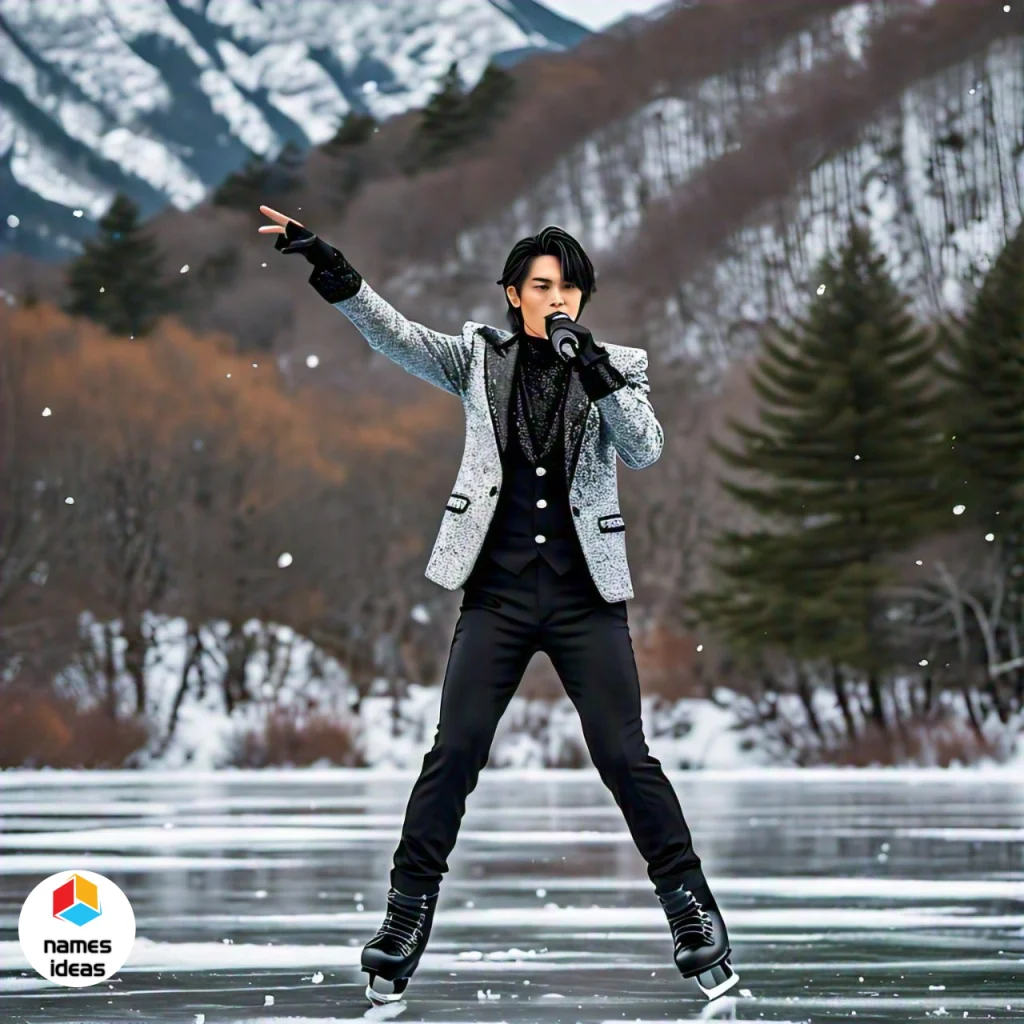
Historical Japanese Names That Mean Ice
- Koori (氷) – “Ice” – Represents the pure essence of winter.
- Yuki (雪) – “Snow” – Evoking the serene beauty of historical snowy landscapes.
- Shimo (霜) – “Frost” – The delicate touch of frost in historical Japanese winters.
- Fuyuki (冬樹) – “Winter” + “Tree” – Symbolizing the tranquil winter scenes in history.
- Sora (空) – “Sky” – The vast, icy sky from historical Japanese art.
- Rei (零) – “Zero” – Connoting the absolute coldness of winter.
- Aoi (青い) – “Blue” – The cool, historical significance of the color blue in Japanese culture.
- Kazu (和) – “Harmony” – The serene and harmonious nature of historical ice and snow.
- Mizuki (水樹) – “Water” + “Tree” – Reflecting the transformation of water to ice in historical contexts.
- Akira (明) – “Bright” – The clear and bright winter light.
- Kaze (風) – “Wind” – The chilly winter winds in historical Japan.
- Yoshiki (芳樹) – “Fragrant Tree” – A reference to natural beauty in historical winter settings.
- Tsubasa (翼) – “Wings” – The graceful flight of birds over icy landscapes.
- Riku (陸) – “Land” – The frozen land in historical Japan.
- Haruki (春樹) – “Spring” + “Tree” – Transitioning from winter to spring, reflecting historical seasons.
- Nori (海) – “Sea” – The icy seas around historical Japan.
- Shinju (真珠) – “Pearl” – The lustrous and serene quality of pearls, akin to ice.
- Hikari (光) – “Light” – The cold, bright winter light.
- Momo (桃) – “Peach” – The rare peach blossoms against a winter backdrop.
- Haruka (遥) – “Distant” – The distant, serene beauty of historical snowy mountains.
- Yume (夢) – “Dream” – The dream-like quality of historical winter scenes.
- Natsu (夏) – “Summer” – A historical contrast with winter’s chill.
- Saki (咲) – “Blossom” – The rare blossoms in winter’s chill.
- Koharu (小春) – “Small Spring” – Reflecting a gentle transition from winter.
- Miyuki (美雪) – “Beautiful Snow” – The aesthetic beauty of snow in historical Japan.
- Rina (理奈) – “Logic” + “Grace” – The elegant nature of ice in historical culture.
- Jin (仁) – “Compassion” – The compassionate warmth one might seek in the cold.
- Sei (青) – “Blue” – The cool, historical significance of blue hues.
- Haru (春) – “Spring” – A nod to the changing seasons from winter to spring.
- Eiko (英子) – “English Child” – Historically, the blend of Eastern and Western influences, including colder climates.
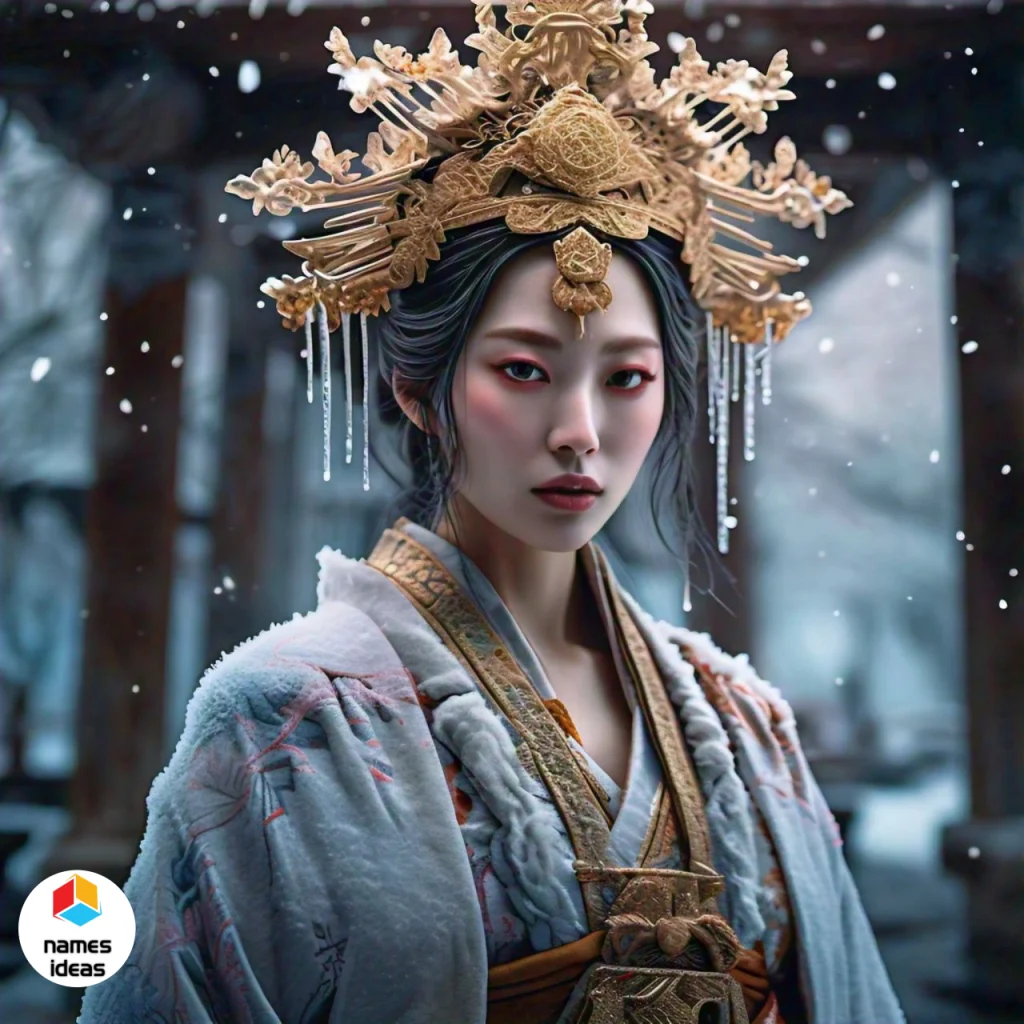
Rare Japanese Names That Mean Ice
- Koorika (氷花) – “Ice Flower” – Symbolizes the beauty of ice as it forms delicate patterns.
- Yukina (雪菜) – “Snow” + “Vegetable” – A unique blend representing snow and nature.
- Fuyuka (冬花) – “Winter” + “Flower” – Reflecting the rare beauty of flowers in winter.
- Shimozuka (霜塚) – “Frost” + “Mound” – A name inspired by frost-covered landscapes.
- Kooriho (氷穂) – “Ice” + “Ear” – Denoting the coolness and delicate nature of ice.
- Yukiko (雪子) – “Snow” + “Child” – A classic but less common name with a wintry feel.
- Himeko (姫子) – “Princess” + “Child” – With an icy elegance and regal touch.
- Mizukaze (水風) – “Water” + “Wind” – Reflecting the chill of icy winds.
- Kooriko (氷子) – “Ice” + “Child” – A name blending the purity of ice with a gentle touch.
- Shimotsuki (霜月) – “Frost” + “Month” – Referring to the month of frost or November.
- Yukari (雪莉) – “Snow” + “Plum” – Combining the coolness of snow with the sweetness of plums.
- Fuyumi (冬美) – “Winter” + “Beauty” – A rare name reflecting the beauty of winter.
- Koorin (氷琳) – “Ice” + “Jewel” – A name denoting the precious and clear nature of ice.
- Yukifuyu (雪冬) – “Snow” + “Winter” – A double dose of winter’s chill.
- Shimoji (霜児) – “Frost” + “Child” – A delicate and rare name.
- Yukari (雪理) – “Snow” + “Logic” – Combining the beauty of snow with a touch of intellect.
- Kooria (氷亜) – “Ice” + “Asia” – Blending icy purity with a cultural touch.
- Fuyuka (冬佳) – “Winter” + “Good” – Reflecting the good qualities of winter.
- Yukihime (雪姫) – “Snow” + “Princess” – A regal name with a snowy touch.
- Kooriko (氷子) – “Ice” + “Child” – Reflecting the purity and delicateness of ice.
- Shimosawa (霜沢) – “Frost” + “Marsh” – Evoking a frost-covered marshland.
- Yukinori (雪乃) – “Snow” + “Field” – A rare name representing snowy fields.
- Koorizumi (氷泉) – “Ice” + “Spring” – Combining the cold of ice with the freshness of a spring.
- Fuyuki (冬希) – “Winter” + “Hope” – Bringing hope and warmth to the cold season.
- Yukihara (雪原) – “Snow” + “Field” – A field covered in snow.
- Kooriyo (氷世) – “Ice” + “World” – A name denoting a world of ice.
- Shimonori (霜乃) – “Frost” + “Field” – A rare name reflecting frost-covered landscapes.
- Yukiko (雪子) – “Snow” + “Child” – A classic name with a cold touch.
- Fuyuka (冬花) – “Winter” + “Flower” – The delicate beauty of flowers in winter.
- Kooriha (氷葉) – “Ice” + “Leaf” – A name representing the delicate nature of leaves touched by ice.
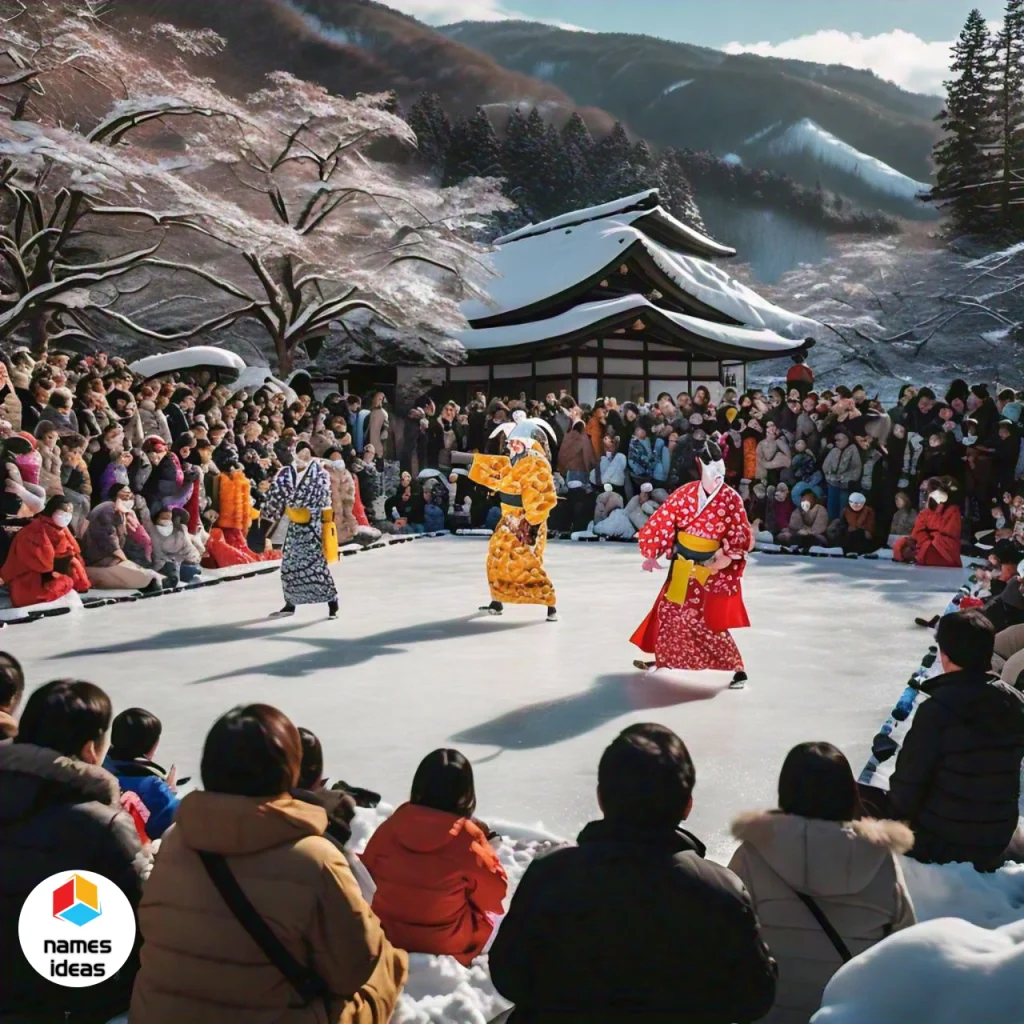
Japanese Names That Mean Ice for Science Fiction
- Kooriha (氷羽) – “Ice” + “Feather” – Symbolizing the delicate, futuristic touch of ice.
- Yukishiro (雪白) – “Snow” + “White” – A pristine, futuristic name with a sleek feel.
- Fuyurei (冬霊) – “Winter” + “Spirit” – Reflecting the ethereal nature of ice in a sci-fi realm.
- Shimoza (霜座) – “Frost” + “Seat” – Evoking a sense of icy authority or command.
- Kooriko (氷子) – “Ice” + “Child” – A cool, futuristic name with a youthful vibe.
- Yukisato (雪里) – “Snow” + “Village” – A name suggesting an icy, distant settlement.
- Mizukiri (水氷) – “Water” + “Ice” – A blend of elements hinting at advanced technology.
- Aokoori (青氷) – “Blue” + “Ice” – Combining a cool hue with the clarity of ice.
- Hikariko (光氷) – “Light” + “Ice” – A name that merges illumination with icy coolness.
- Reika (零華) – “Zero” + “Flower” – The beauty of ice at absolute zero.
- Koorin (氷凛) – “Ice” + “Dignified” – A strong, futuristic name with an icy edge.
- Shimoshi (霜士) – “Frost” + “Warrior” – An evocative name for a sci-fi warrior with a frosty demeanor.
- Yukiro (雪路) – “Snow” + “Path” – Suggesting a path or journey through a snowy sci-fi landscape.
- Fuyumei (冬名) – “Winter” + “Name” – A name that hints at coldness and importance in a futuristic world.
- Kooria (氷亜) – “Ice” + “Asia” – Combining the coolness of ice with a global touch.
- Yukiharu (雪晴) – “Snow” + “Clear” – A name evoking clear, icy skies.
- Shinshimo (新霜) – “New” + “Frost” – A modern twist on classic frostiness.
- Kooriko (氷子) – “Ice” + “Child” – A futuristic name with a hint of innocence and coldness.
- Fuyumi (冬美) – “Winter” + “Beauty” – Emphasizing the elegant and striking beauty of ice.
- Yukiryu (雪竜) – “Snow” + “Dragon” – A name with mythical, icy power.
- Koorinari (氷成) – “Ice” + “Form” – Signifying the formation or creation of ice.
- Shimosawa (霜沢) – “Frost” + “Marsh” – A cool, enigmatic name for a futuristic swamp.
- Yukihime (雪姫) – “Snow” + “Princess” – A regal and icy name for a sci-fi queen or heroine.
- Koorisawa (氷沢) – “Ice” + “Valley” – Evoking an icy valley or cold environment.
- Fuyukage (冬影) – “Winter” + “Shadow” – Suggesting the mysterious and dark side of ice.
- Yukiryo (雪涼) – “Snow” + “Cool” – A name embodying the essence of cold and clarity.
- Koorine (氷音) – “Ice” + “Sound” – Reflecting the futuristic sound of ice in a sci-fi world.
- Shimozumi (霜泉) – “Frost” + “Spring” – Combining the coolness of frost with a refreshing spring.
- Yukitsuki (雪月) – “Snow” + “Moon” – An evocative name suggesting an icy moonlit night.
- Fuyuki (冬紀) – “Winter” + “Era” – A name signifying a new era in a cold, futuristic age.
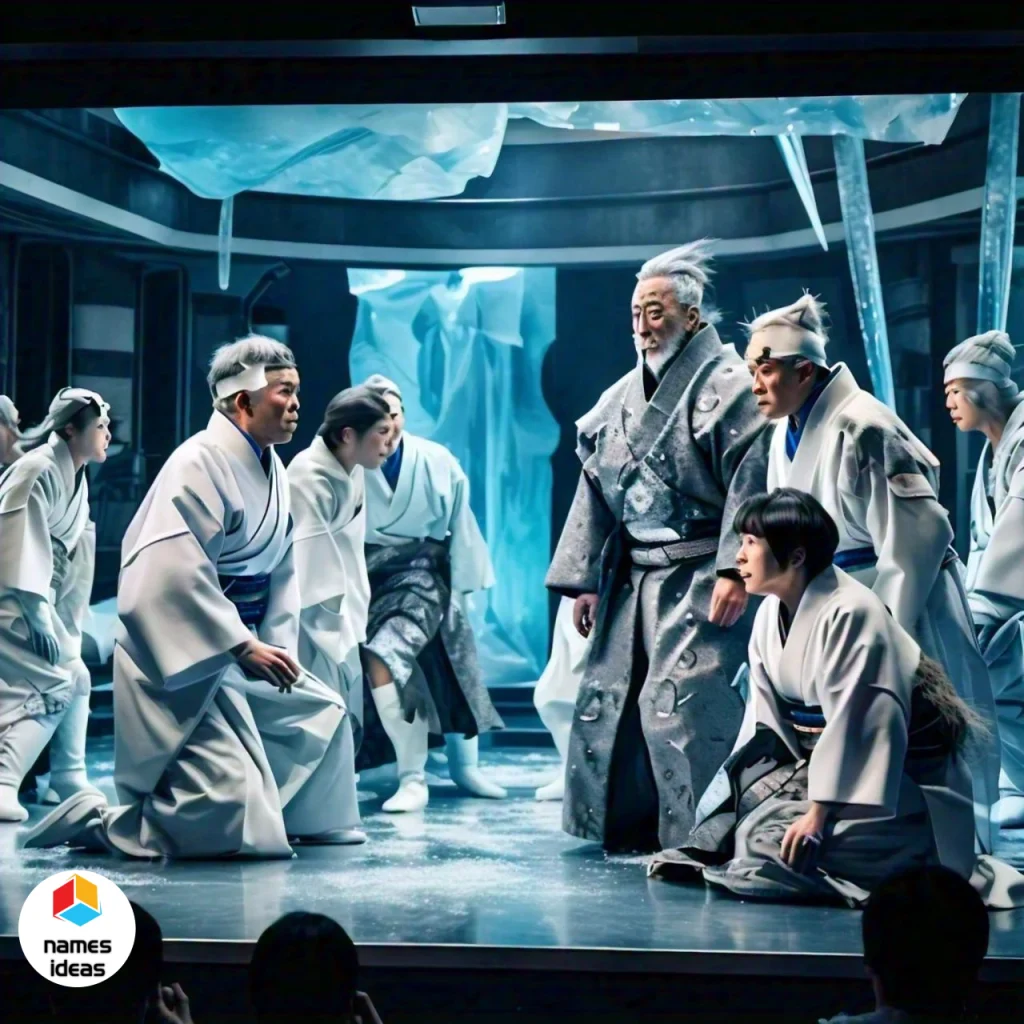
Artistic Japanese Names That Mean Ice
- Koori (氷) – “Ice” – Simple yet profound, capturing the essence of ice.
- Yukihime (雪姫) – “Snow Princess” – Evoking a delicate, royal beauty.
- Fuyuki (冬樹) – “Winter Tree” – Combining the stark beauty of winter with natural elegance.
- Shimosawa (霜沢) – “Frost Marsh” – Artistic imagery of a frosted landscape.
- Mizuki (水樹) – “Water Tree” – A name that combines fluidity with icy coolness.
- Aoi (青い) – “Blue” – Reflecting the tranquil and artistic blue hues of ice.
- Kooriko (氷子) – “Ice Child” – A whimsical, artistic touch.
- Hikariko (光氷) – “Light Ice” – Combining the clarity of ice with a luminous quality.
- Shimoji (霜児) – “Frost Child” – A delicate, artistic name with a cool edge.
- Yukino (雪乃) – “Snow Field” – Evoking a serene and expansive snowy landscape.
- Kooria (氷亜) – “Ice Asia” – Blending cultural and icy elements with an artistic flair.
- Fuyurei (冬霊) – “Winter Spirit” – Artistic and ethereal, suggesting a ghostly presence.
- Yukihara (雪原) – “Snow Field” – An artistic representation of a vast snowy expanse.
- Kooriha (氷羽) – “Ice Feather” – Combining the lightness of feathers with the coldness of ice.
- Shinshimo (新霜) – “New Frost” – Artistic and fresh, with a modern twist on frost.
- Yukitsuki (雪月) – “Snow Moon” – Evoking the serene beauty of a moonlit snow scene.
- Koorin (氷凛) – “Ice Dignified” – A name reflecting the dignified and elegant quality of ice.
- Shimoshi (霜士) – “Frost Warrior” – Artistic and bold, combining frost with a warrior’s strength.
- Fuyumi (冬美) – “Winter Beauty” – A name that highlights the artistic allure of winter.
- Yukina (雪菜) – “Snow Vegetable” – A whimsical and artistic blend of snow and nature.
- Koorika (氷花) – “Ice Flower” – Combining the beauty of flowers with the coldness of ice.
- Yukiryu (雪竜) – “Snow Dragon” – An artistic and mythical name with icy undertones.
- Shimosaki (霜咲) – “Frost Blossom” – Merging the delicate nature of blossoms with frost.
- Yukihime (雪姫) – “Snow Princess” – Combining royalty with the artistic beauty of snow.
- Koorine (氷音) – “Ice Sound” – Reflecting the unique and artistic sounds associated with ice.
- Shimoshi (霜志) – “Frost Intention” – Artistic and contemplative, reflecting the nature of frost.
- Yukihara (雪原) – “Snow Field” – Evoking the expansive and artistic beauty of a snowy field.
- Kooriha (氷葉) – “Ice Leaf” – Merging the delicate nature of leaves with the chill of ice.
- Fuyuka (冬花) – “Winter Flower” – A name that beautifully blends winter and floral artistry.
- Shimozumi (霜泉) – “Frost Spring” – Combining the cold of frost with the refreshing aspect of spring.
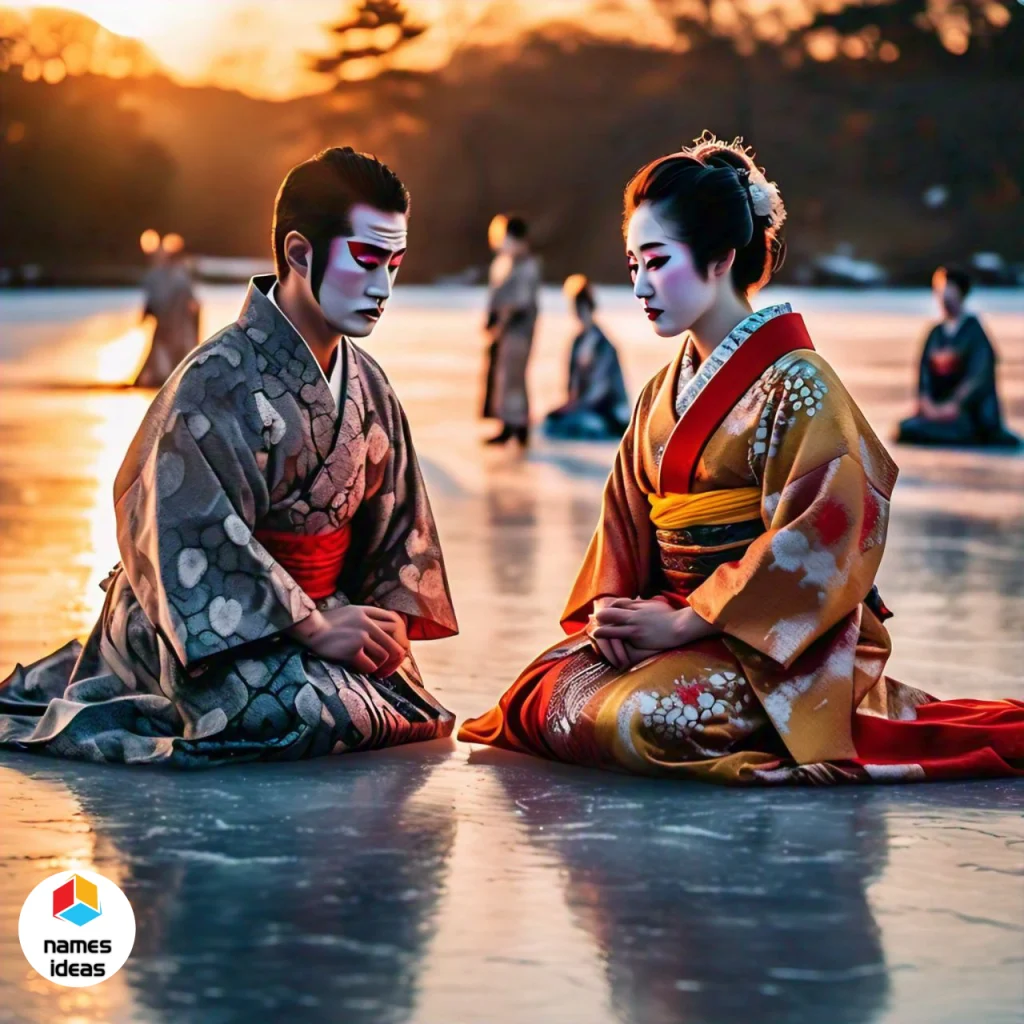
Cultural Significance of Japanese Names That Mean Ice
- Koori (氷) – “Ice”
- Yuki (雪) – “Snow”
- Shimo (霜) – “Frost”
- Fuyuki (冬樹) – “Winter Tree”
- Mizuki (水樹) – “Water Tree”
- Aoi (青い) – “Blue”
- Kooriko (氷子) – “Ice Child”
- Hikariko (光氷) – “Light Ice”
- Shimosawa (霜沢) – “Frost Marsh”
- Yukino (雪乃) – “Snow Field”
- Kooria (氷亜) – “Ice Asia”
- Fuyurei (冬霊) – “Winter Spirit”
- Yukihara (雪原) – “Snow Field”
- Kooriha (氷羽) – “Ice Feather”
- Shinshimo (新霜) – “New Frost”
- Yukitsuki (雪月) – “Snow Moon”
- Koorin (氷凛) – “Ice Dignified”
- Shimoshi (霜士) – “Frost Warrior”
- Fuyumi (冬美) – “Winter Beauty”
- Yukina (雪菜) – “Snow Vegetable”
- Koorika (氷花) – “Ice Flower”
- Yukiryu (雪竜) – “Snow Dragon”
- Shimosaki (霜咲) – “Frost Blossom”
- Koorine (氷音) – “Ice Sound”
- Shimoshi (霜志) – “Frost Intention”
- Yukihara (雪原) – “Snow Field”
- Kooriha (氷葉) – “Ice Leaf”
- Fuyuka (冬花) – “Winter Flower”
- Shimozumi (霜泉) – “Frost Spring”
- Yukihime (雪姫) – “Snow Princess”
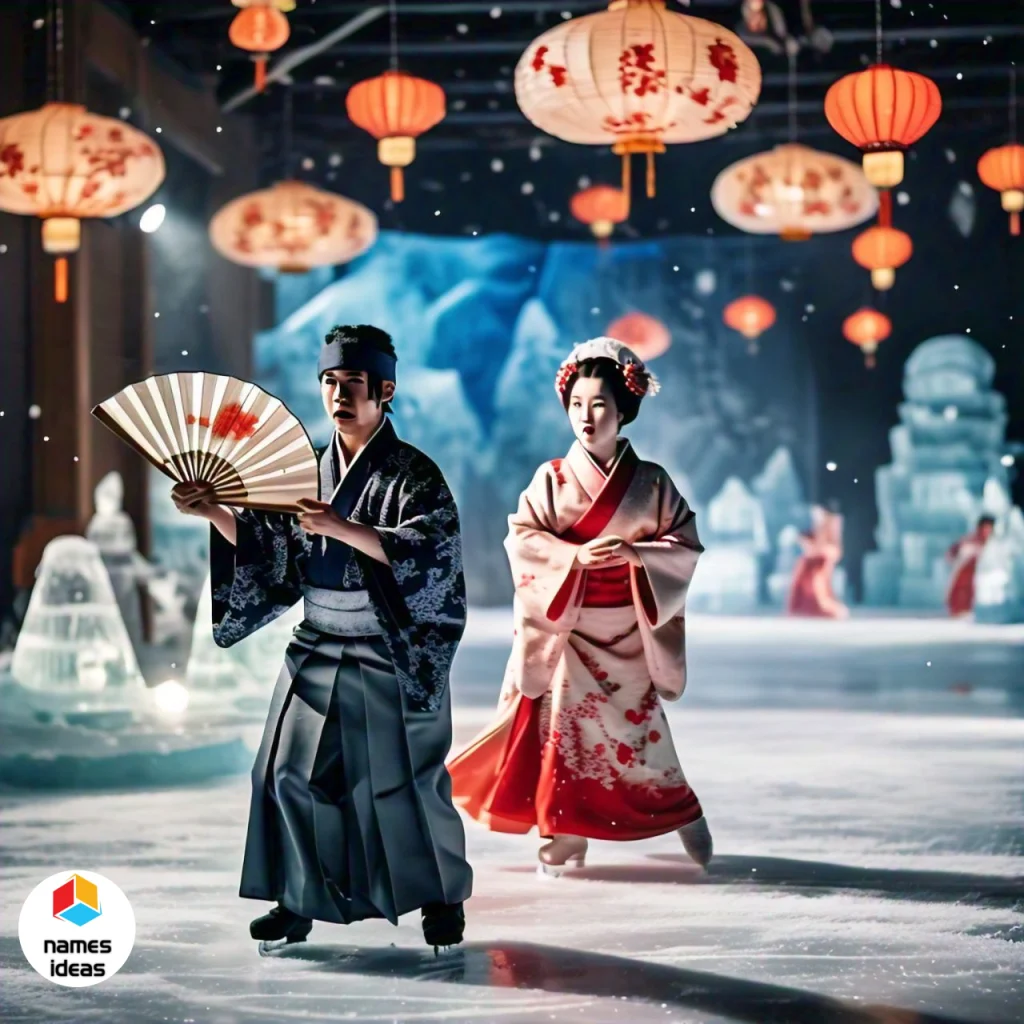
Conclusion
Japanese names that mean ice, such as “Yuki” and “Koori,” often carry a sense of purity and elegance, reflecting the serene beauty of winter. These names are not only steeped in cultural significance but also appear frequently in anime, literature, and popular media, symbolizing themes of clarity and tranquility. Their use in modern contexts highlights a fascination with nature’s subtleties and the timeless appeal of Japanese onomastics. Whether chosen for fictional characters or real-life names, these names evoke a sense of cool sophistication and enduring charm.
FAQs
Common names include “Yuki” (雪), which means “snow” but is often associated with ice, and “Koori” (氷), which directly translates to “ice.” Other variations might include names like “Fuyuki” (冬樹), meaning “winter tree,” which is related to the cold season.
Yes, “Yuki” can be used for both boys and girls, though it is more commonly given to girls. “Koori” is less common but can be used for any gender. Names like “Fuyuki” can be used for both genders as well.

